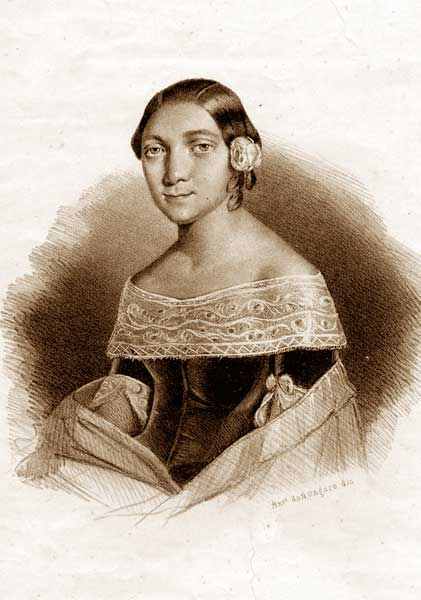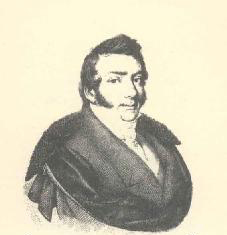|
Marianna Barbieri-Nini
Marianna Barbieri-Nini (18 February 1818 in Florence – 27 November 1887 in Florence) was an Italian operatic soprano who had an active career in Italy's major opera houses from 1840 through 1856. She also made appearances at the Liceu in Barcelona, the Teatro Real in Madrid, Her Majesty's Theatre in London, and at theatres in Paris. She possessed a powerful voice with coloratura facility and was known for her highly dramatic singing and acting. She was especially admired in the title roles of Gaetano Donizetti's ''Anna Bolena'' and Gioachino Rossini's ''Semiramide''. She was also successful in the operas of Giuseppe Verdi, notably creating roles in the world premieres of three of his works. Life and career Born in Florence, Barbieri-Nini studied singing with Luigi Barbieri, Giuditta Pasta, and Nicola Vaccai. In 1840 she made her professional opera debut at La Scala as Antonina in Donizetti's ''Belisario''; a performance which was negatively received. She had her first succes ... [...More Info...] [...Related Items...] OR: [Wikipedia] [Google] [Baidu] |
Nicola Vaccai
Nicola Vaccai (15 March 1790 – 5 or 6 August 1848) was an Italian composer, particularly of operas, and a singing teacher. Life and career as a composer Born at Tolentino, he grew up in Pesaro, and studied music there until his parents sent him to Rome to study law. Having no intention of becoming a lawyer, he took voice lessons and eventually studied counterpoint with Giuseppe Jannaconi, an important Roman composer. When Vaccai turned twenty one, he went to Naples and became a disciple of Paisiello, whose ''Barber of Seville'' was considered a comic masterpiece until Rossini's ''Barber'' swept it from the stage 35 years later.J.G. Paton, 'Introduction', in Nicola Vaccai, ''Practical Method of Italian Singing'' ed. J.G. Paton (G. Schirmer, 1975), pp. iii-iv. Vaccai launched his career in Venice, initially earning his living by writing ballets and teaching voice. He had his first operatic success with ''I solitari di Scozia'' in Naples in 1815. In Parma he was commissioned to ... [...More Info...] [...Related Items...] OR: [Wikipedia] [Google] [Baidu] |
19th-century Italian Women Opera Singers
The 19th (nineteenth) century began on 1 January 1801 ( MDCCCI), and ended on 31 December 1900 ( MCM). The 19th century was the ninth century of the 2nd millennium. The 19th century was characterized by vast social upheaval. Slavery was abolished in much of Europe and the Americas. The First Industrial Revolution, though it began in the late 18th century, expanding beyond its British homeland for the first time during this century, particularly remaking the economies and societies of the Low Countries, the Rhineland, Northern Italy, and the Northeastern United States. A few decades later, the Second Industrial Revolution led to ever more massive urbanization and much higher levels of productivity, profit, and prosperity, a pattern that continued into the 20th century. The Islamic gunpowder empires fell into decline and European imperialism brought much of South Asia, Southeast Asia, and almost all of Africa under colonial rule. It was also marked by the collapse of the large S ... [...More Info...] [...Related Items...] OR: [Wikipedia] [Google] [Baidu] |
Italian Operatic Sopranos
Italian(s) may refer to: * Anything of, from, or related to the people of Italy over the centuries ** Italians, an ethnic group or simply a citizen of the Italian Republic or Italian Kingdom ** Italian language, a Romance language *** Regional Italian, regional variants of the Italian language ** Languages of Italy, languages and dialects spoken in Italy ** Italian culture, cultural features of Italy ** Italian cuisine, traditional foods ** Folklore of Italy, the folklore and urban legends of Italy ** Mythology of Italy, traditional religion and beliefs Other uses * Italian dressing, a vinaigrette-type salad dressing or marinade * Italian or Italian-A, alternative names for the Ping-Pong virus, an extinct computer virus See also * * * Italia (other) * Italic (other) * Italo (other) * The Italian (other) * Italian people (other) Italian people may refer to: * in terms of ethnicity: all ethnic Italians, in and outside of Italy * i ... [...More Info...] [...Related Items...] OR: [Wikipedia] [Google] [Baidu] |
1887 Deaths
Events January–March * January 11 – Louis Pasteur's anti-rabies treatment is defended in the Académie Nationale de Médecine, by Dr. Joseph Grancher. * January 20 ** The United States Senate allows the Navy to lease Pearl Harbor as a naval base. ** British emigrant ship ''Kapunda'' sinks after a collision off the coast of Brazil, killing 303 with only 16 survivors. * January 21 ** The Amateur Athletic Union (AAU) is formed in the United States. ** Brisbane receives a one-day rainfall of (a record for any Australian capital city). * January 24 – Battle of Dogali: Abyssinian troops defeat the Italians. * January 28 ** In a snowstorm at Fort Keogh, Montana, the largest snowflakes on record are reported. They are wide and thick. ** Construction work begins on the foundations of the Eiffel Tower in Paris, France. * February 2 – The first Groundhog Day is observed in Punxsutawney, Pennsylvania. * February 4 – The Interstate Commerce Act ... [...More Info...] [...Related Items...] OR: [Wikipedia] [Google] [Baidu] |
1818 Births
Events January–March * January 1 ** Battle of Koregaon: Troops of the British East India Company score a decisive victory over the Maratha Empire. ** Mary Shelley's ''Frankenstein'' is published anonymously in London. * January 2 – The British Institution of Civil Engineers is founded. * January 3 (21:52 UTC) – Venus occults Jupiter. It is the last occultation of one planet by another before November 22, 2065. * January 6 – The Treaty of Mandeswar brings an end to the Third Anglo-Maratha War, ending the dominance of Marathas, and enhancing the power of the British East India Company, which controls territory occupied by 180 million Indians. * January 11 – Percy Bysshe Shelley's ''Ozymandias'' is published pseudonymously in London. * January 12 – The Dandy horse (''Laufmaschine'' bicycle) is invented by Karl Drais in Mannheim. * February 3 – Jeremiah Chubb is granted a British patent for the Chubb detector lock. * February 5 – Upon his death, K ... [...More Info...] [...Related Items...] OR: [Wikipedia] [Google] [Baidu] |
Teatro Lirico Giuseppe Verdi
The Teatro Lirico Giuseppe Verdi is an opera house located in Trieste, Italy and named after the composer Giuseppe Verdi. Privately constructed, it was inaugurated as the Teatro Nuovo to replace the smaller 800-seat "Cesareo Regio Teatro di San Pietro" on 21 April 1801 with a performance of Johann Simon Mayr's ''Ginevra di Scozia''. Initially, the Nuovo had 1,400 seats. In 1821, it became known as the Teatro Grande. By the end of the 18th century, the need for a new theatre in Trieste became evident. Its main theatre, the Teatro di San Pietro, had become increasingly inadequate and closed in 1800. A proposal to the Austrian Chancery from Giovanni Matteo Tommasini to build a private theatre had existed since 1795 and, in June 1798, a contract was drawn up whereby annual funding would come from the municipality and Tommasini would hold the rights to several boxes and the rights to sell others. Gian Antonio Selva, the architect of the La Fenice in Venice, was engaged, and he designed ... [...More Info...] [...Related Items...] OR: [Wikipedia] [Google] [Baidu] |
Il Corsaro
''Il corsaro'' (''The Corsair'') is an opera in three acts by Giuseppe Verdi, from a libretto by Francesco Maria Piave, based on Lord Byron's 1814 poem ''The Corsair''. The first performance was given at the Teatro Grande in Trieste on 25 October 1848. Composition history The composer expressed interest in Byron's poem ''The Corsair'' (along with ''The Two Foscari'' and others) as early as 1844 when he was planning an opera for Venice, but a suitable baritone was not available.Budden, pp. 363 – 366 In 1845, (before it was determined that ''I masnadieri'' was to be the opera presented in London), the composer had contracted with the Milanese publisher, Francesco Lucca, for three operas, including ''Attila'' and one for London. Three things prevented it from being ''I masnadieri'' at that time: firstly, Verdi's illness postponed any opera for London for almost a year; secondly, he demanded that the work be ''Il corsaro'' and that it be written by Piave, who had begun work; and, ... [...More Info...] [...Related Items...] OR: [Wikipedia] [Google] [Baidu] |
Macbeth (opera)
''Macbeth'' () is an opera in four acts by Giuseppe Verdi, with an Italian libretto by Francesco Maria Piave and additions by Andrea Maffei, based on William Shakespeare's play of the same name. Written for the Teatro della Pergola in Florence, it was Verdi's tenth opera and premiered on 14 March 1847. ''Macbeth'' was the first Shakespeare play that Verdi adapted for the operatic stage. Almost twenty years later, ''Macbeth'' was revised and expanded in a French version and given in Paris on 19 April 1865. After the success of ''Attila'' in 1846, by which time the composer had become well established, ''Macbeth'' came before the great successes of 1851 to 1853 (''Rigoletto'', ''Il trovatore'' and '' La traviata'') which propelled him into universal fame. As sources, Shakespeare's plays provided Verdi with lifelong inspiration: some, such as an adaption of ''King Lear'' (as ''Re Lear'') were never realized, but he wrote his two final operas using ''Othello'' as the basis for ' ... [...More Info...] [...Related Items...] OR: [Wikipedia] [Google] [Baidu] |
Teatro Argentina
The Teatro Argentina (directly translating to "Theatre Argentina") is an opera house and Theater (structure), theatre located in Largo di Torre Argentina, a square in Rome, Italy. One of the oldest theatres in Rome, it was constructed in 1731 and inaugurated on 31 January 1732Plantamura, 10 with ''Berenice'' by Domenico Sarro. It is built over part of the curia section of the Theatre of Pompey. This curia was the location of the assassination of Julius Caesar. History The theatre was commissioned by the Sforza-Cesarini family and designed by the architect Gerolamo Theodoli, with the auditorium laid out in the traditional horseshoe shape. Duke Francesco Sforza-Cesarini, who ran the Argentina Theatre from 1807 to 1815, was a "theatre fanatic" who continued until his death to run up debts. Rossini's ''The Barber of Seville'' was given its premiere here on 20 February 1816, just after Duke Francesco's death and, in the 19th century, the premieres of many notable operas took place in ... [...More Info...] [...Related Items...] OR: [Wikipedia] [Google] [Baidu] |
Teatro Della Pergola
The Teatro della Pergola is an historic opera house in Florence, Italy. It is located in the centre of the city on the Via della Pergola, from which the theatre takes its name. It was built in 1656 under the patronage of Cardinal Gian Carlo de' Medici to designs by the architect Ferdinando Tacca, son of the sculptor Pietro Tacca; its inaugural production was the opera buffa, '' Il potestà di Colognole'' by Jacopo Melani. The opera house, the first to be built with superposed tiers of boxes rather than raked semi-circular seating in the Roman fashion,As in the Teatro Olimpico of Vicenza, designed by Andrea Palladio in the previous century. is considered to be the oldest in Italy, having occupied the same site for more than 350 years. It has two auditoria, the 'Sala Grande', with 1,500 seats, and the 'Saloncino', a former ballroom located upstairs which has been used as a recital hall since 1804 and which seats 400. Work on completing the interior was finished in 1661, in time fo ... [...More Info...] [...Related Items...] OR: [Wikipedia] [Google] [Baidu] |





.jpg)
